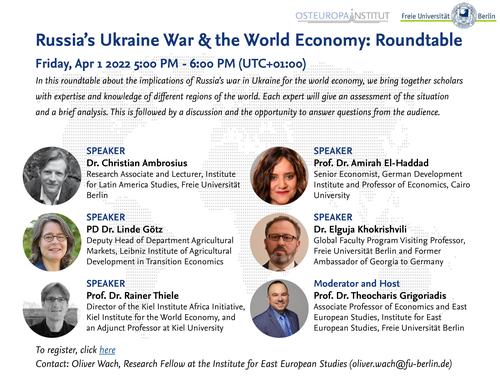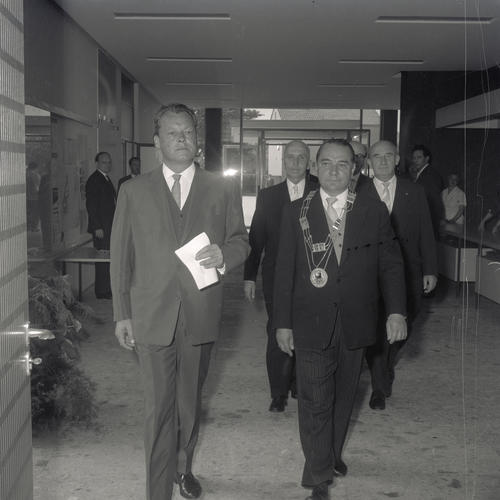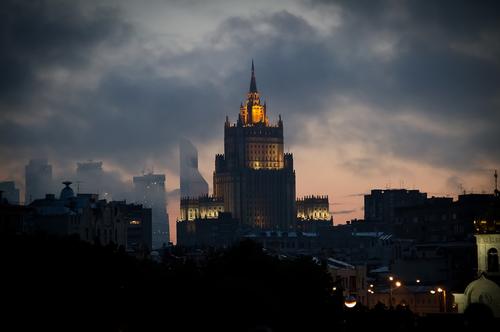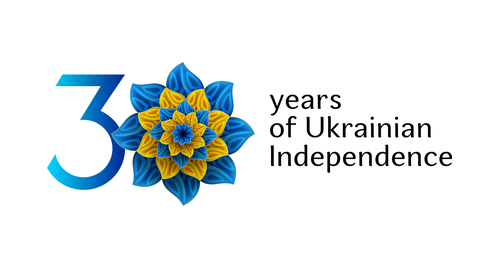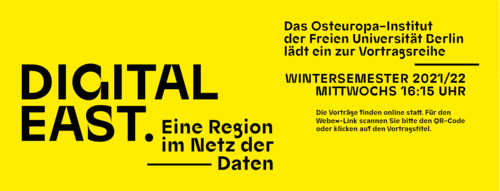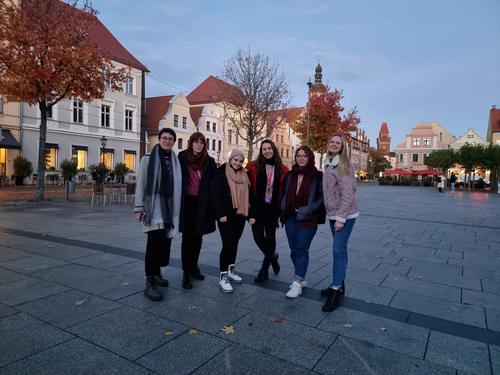REVIEW OF THE WINTER SEMESTER 2021/22
Russia’s War in Ukraine and the World Economy: Roundtable
This roundtable discussed the impact of Russia's war in Ukraine on the global economy. Scholars with expertise and knowledge of different regions of the world were brought together to discuss together. Participants presented their assessment of the situation and a brief analysis of their respective areas of expertise in short statements. This was followed by a discussion and questions from the audience were answered. The aim of the roundtable was to create bridges of communication and discussion in German and European society and to discuss the impact of the war on regions that have not received enough attention so far. The roundtable was organized by research assistant Oliver Wach and Professor Theocharis Grigoriadis.
Anniversary exhibition "70 years OEI" on the FU campus
Last year, the Osteuropa-Institut celebrated the seventieth anniversary of its founding in 1951. For the first time, the anniversary exhibition "70 Years of the OEI" dealt with a wide-ranging review of the history of the Osteuropa-Institut, reflecting Berlin's and Germany's eventful relations with its eastern neighbors. Highlights were cast on the Institute's confrontation with National Socialism as well as on its development at the time of the student protests and the years of system collapse and system transformation since the 1990s. The exhibition was designed as a joint project of the work areas, the students and the secretaries of the OEI. After a festive event for the opening of the exhibition on 01.11.2021, the exhibition banners were on display in the winter semester 2021/22 in the Henry Ford Building and in the Silberlaube of the FU. Since the beginning of February, selected parts of the exhibition have been presented in the institute foyer at Garystraße 55 during the regular opening hours of the OEI (Mon-Fri from 8am-8pm).
International Symposium “From Berlin Wall to New Conflict: Eastern European Cleavages and Encounters”
Außenministerium der Russischen Föderation
Image Credit: NikolayFrolochkin / 84 images
The international symposium was a central event of the anniversary celebrations and at the same time a platform for discussing the cultural, political, economic and social complexity of Eastern Europe over the past thirty years.
Three panels of the symposium focus on the consolidation of authoritarian regimes in Eastern Europe, state capitalism and its role in economic and social development, and civil culture, protests, and dissidence in Eastern European countries.
Symposium on the occasion of the retirement of Prof. Dr. Gertrud Pickhan
On November 26, 2021, Prof. Dr. Gertrud Pickhan was given a ceremonial farewell by the FU with a festive symposium. The festive symposium honored Gertrud Pickhan's work and her many years of teaching, which shaped a generation of historians of Eastern Europe. Ms. Pickhan retains her examination privileges in retirement.
Days of Ukraine in Berlin and Brandenburg
The „Days of Ukraine in Berlin and Brandenburg“ took place on September 16 and 17, 2021, on the occasion of the 30th anniversary of Ukraine's independence and the 70th anniversary of the Institute for Eastern European Studies at Freie Universität Berlin, and was organized by FU Berlin under the chairmanship of Prof. Theocharis Grigoriadis, Institute for Eastern European Studies at Freie Universität Berlin, in cooperation with the German-Ukrainian Academic Society. For the first time, this academic networking conference provided an excellent exchange platform for German-Ukrainian cooperation in higher education, science and research in Berlin, Brandenburg and beyond. More than a hundred guests from Germany, Ukraine and other countries attended the event. Speakers at the conference included scientists from Freie Universität Berlin, the University of Potsdam, Humboldt-Universität zu Berlin, the National Mechnikov Institute Odessa, the National Taras Shevchenko University, the National Academy of Sciences of Ukraine, the Center for Eastern European and International Studies (ZOIS) and other universities and institutions, as well as the Ukrainian Ambassador to Germany.
"Digital East. A region in the network of data" - now online
The basic lecture at the Institute for East European Studies in the winter semester 2021/22 is now available online. How does Eastern Europe present itself as a digital region? While research has focused intensively on the socio-political transformations in Eastern Europe over the past decades, it has remained virtually unexplained how profoundly not only digital transformation has changed and continues to change the region, but also how massively digital media has been a driver of these transformations. The lecture illuminated this blind spot of Eastern European studies and undertook a first sighting of this space in the web of data.
Workshop "(Anti)Discrimination in Study and Teaching"
The short workshop enabled a systematic examination of diversity and (anti-)discrimination . It provided both an overview of central concepts and an opportunity for joint reflection on experiences and challenges in studying and teaching, especially under pandemic conditions.
Culture Seminar: Film Expeditions in Eastern Europe
The students of the OEI visited the Festival of Central and Eastern European Film in Cottbus (FFC) in November. The seminar took place through the cooperation between Freie Universität Berlin and Universität Potsdam.
Erasmus+
This year, the OEI, under the leadership of Julia Zimmermann from the Department of Economics, has once again joined forces with the FU's Department of Academic Relations to apply for EU mobility funds to Eastern Europe and Central Asia. This year's applications to the Eastern Europe application region are intended to secure existing exchanges to Armenia, Georgia, and Ukraine through 2025. For Ukraine, funding has been requested for the Kyiv universities Taras Shevchenko and Mohyla Academy, Ivan Franko University in Lviv, and Mechnikov University in Odessa. Especially due to the war-related ruptures in educational and research biographies and the destruction of infrastructure in the wake of the invasion of Ukraine, we hope to strengthen our academic ties to Ukraine.
Conceived as a transnational interlinked space, this year an additional focus was placed on the application region of Central Asia. Applications were submitted for mobility funds with the leading and in part English-speaking universities in Uzbekistan, Kazakhstan, and Kyrgyzstan, which are intended to strengthen and expand the Central Asia competence at the Institute. Decisions on the two regional applications submitted in mid-February are traditionally made in June. These applications would not have been possible without the active support of Dimitrios Moschos, the student assistant in the Economics Department.
Women's funding plan 2022-23
In the winter semester 2021/2022, all status groups of the Institute for East European Studies, under the leadership of the decentralized women's representative Anja Locascio, have once again dedicated themselves to the question of how working, research and study conditions for women at the Institute can be improved. For the second time, our staff member, Julia Zimmermann, has very successfully campaigned for the improvement of the training and research conditions of female academic staff at the Institute for East European Studies. Her main concern in this round was also to ensure equal doctoral conditions and how these can accommodate different family contexts. The current work, valid for 2022 and 2023, can be viewed here.
